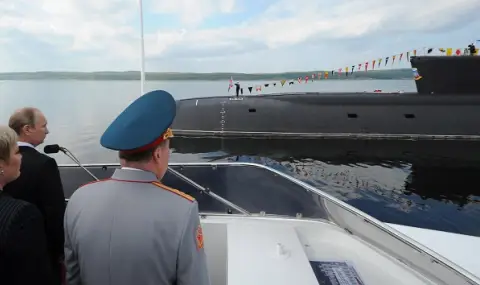A new region has begun to emerge with its tensions, increasing the West's problems in the confrontation with Russia. As Russia and China project their power in the Arctic, Western security officials are raising concerns about NATO's readiness to meet the threat. "While force numbers remain lower than they were during the Cold War, Russian military activity and modernization have increased and capabilities in the Arctic have shifted the balance of power unlike in the Cold War." This is explained by Ethan Wong, a research fellow at the Center for Climate and Security in Washington, quoted by the London-based Saudi newspaper "Ash-Sharq al-Awsat".
"Now Russia is different and increasingly unpredictable,'' Wong adds. US officials say Russia's military buildup in the Arctic is raising tensions, prompting the Pentagon to rethink its strategy and funding in the region. Russia has a strong focus on the Arctic, with more than half of the Arctic in Russian territory. This concern has also been heightened by the impact of climate change, which experts say has played a role in the militarization of the region. As more Arctic glaciers melt, sea lanes become more navigable, leading to a growing number of countries turning their attention to Arctic sea lanes. Melting sea ice makes the region easier to enter and navigate, but makes Arctic countries more vulnerable. "Navigable waters increasingly provide opportunities, such as navigation, but also create new observation areas that were previously naturally protected," says Wong. "Climate change is opening up the Arctic to new actors and more military and economic activity."
Why is the Arctic important?
"The Arctic region, also known as the Arctic Ocean, contains 30 percent of the world's untapped natural gas and 13 percent of potential oil reserves," says Wong. The region's mineral resources - including iron ore, copper, nickel, zinc phosphate and even diamonds - are valued at up to $1 trillion. He adds: "These riches alone make the region an attractive target, but there are also opportunities in terms of security. The role of the Arctic as a potential opportunity for attack has been emerging since the Cold War." "The Arctic is critical to defense because the region is typically the shortest distance between the United States and Eurasia, making it an attractive area to attack adversaries," Wong noted. During the Cold War, Soviet bombers and missiles were a threat, prompting the United States and Canada to form the North American Aerospace Defense Command (NORAD) in 1958 and build a network of radars and bases throughout the region. This old infrastructure is critical today as the Arctic remains a strategic approach for potential adversaries. For more than a decade, security experts have warned about Russia's ambitions in the Arctic. In recent years, Moscow has built more than 475 military installations in the Arctic Ocean, including bases, airfields, electronic warfare infrastructure and maritime defense systems. Russia's Northern Fleet, based in the Arctic city of Severomorsk, includes more than 30 ships and more than 20 submarines, including nuclear submarines and others carrying long-range cruise missiles capable of reaching Canada and America. Russian President Vladimir Putin ordered submarines to take part in intensive exercises shortly after Russia invaded Ukraine in early 2022. "Overall, Russia has a third more specialized military installations in the Arctic than NATO, according to the International Institute for Strategic research," says Wong. Reuters reported that the West needs at least 10 years to catch up with Russia's military in the region, if it chooses to do so. "What Russia is doing in the Arctic is troubling because Russia is developing its ability to impose what it considers to be the rightful Arctic region," Wong explains. In addition to its military forces in the Arctic, Russia has extensive territorial claims in the region, including the Arctic and the vital Northern Sea Route, a shipping lane that dramatically shortens travel distances between Asia and Europe. "When it comes to the Northern Sea Route, the United States has limited options to challenge Russian control," Wong said. The United States has never ratified the UN Convention on the Law of the Sea, leaving it out of contention. Wong noted that while the United States could send ships into the corridor as a challenge to freedom of navigation in international waters, "such an operation would be a direct confrontation given the proximity of the route to Russian territory.
The role of China
Last year, Russia increased its influence in the region by forming an Arctic partnership with China, focused on developing infrastructure along the Arctic Road. China and Russia have already forged a closer relationship since the invasion of Ukraine in February 2022. Analysts see their cooperation in the Arctic as another sign of deepening their economic and strategic relationship. China and Russia have held joint exercises in the Arctic twice in the past 20 months and expressed a common interest in exploiting the Arctic region's resources. In this regard, Wang says: "Although it is a non-Arctic country, China is active and serious in the region and has engaged in economic, scientific, diplomatic and military activities to reach and influence the Arctic to achieve its ambitions to become polar strength."
Wong also adds: "Chinese buoys in the Arctic that monitor the ice sheets can also be used to track the movement of US submarines." Chinese research vessels can carry out polar research, but also underwater reconnaissance. China is also currently building three icebreakers, a move aimed at opening the Northern Sea Route to commercial shipping and further strengthening economic ties with Russia. Security analysts have expressed concern that Washington and its NATO partners are ill-prepared to counter the Russian-Chinese threat in the region. No NATO member state has icebreakers with anti-air and anti-submarine capabilities. Wong concludes: "Rising political tensions between the West and Russia have only increased the risk of conflict in this strategic corner of the planet - a place that was once an area of cooperation between Russia and the West."
